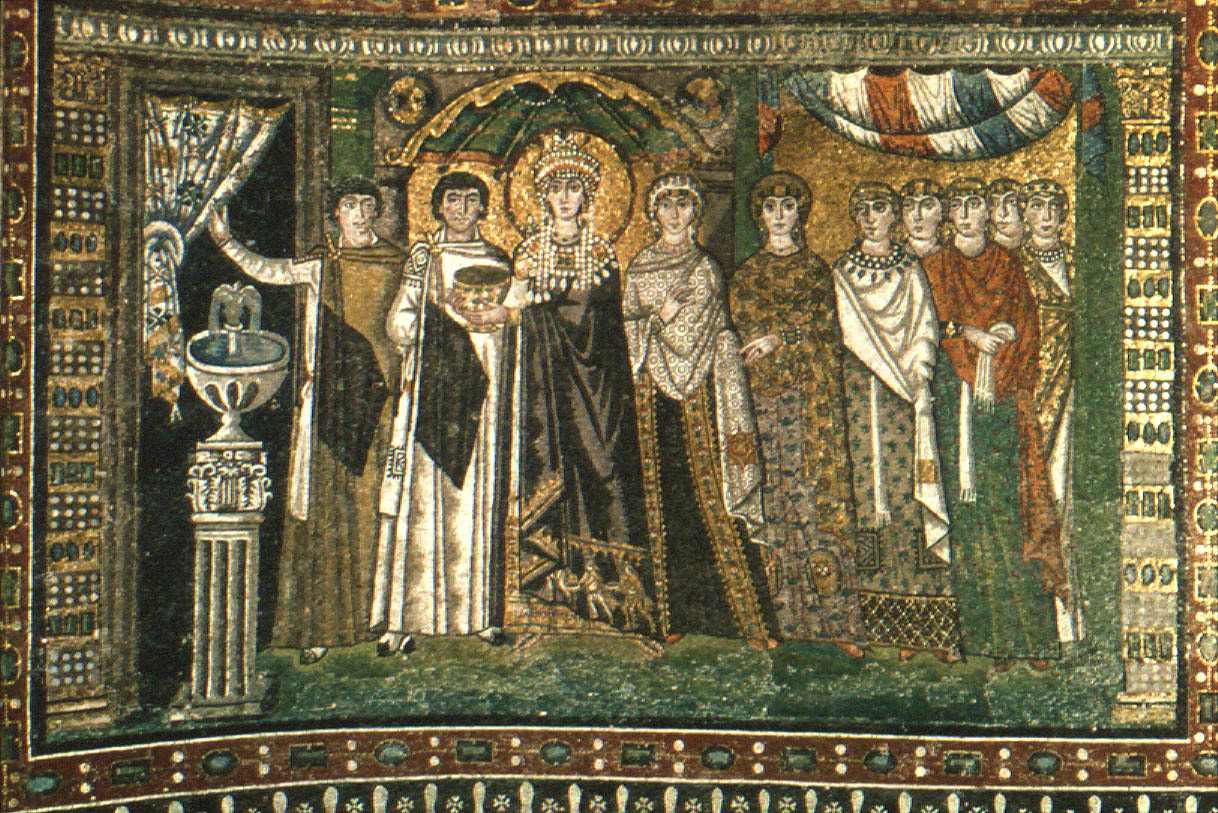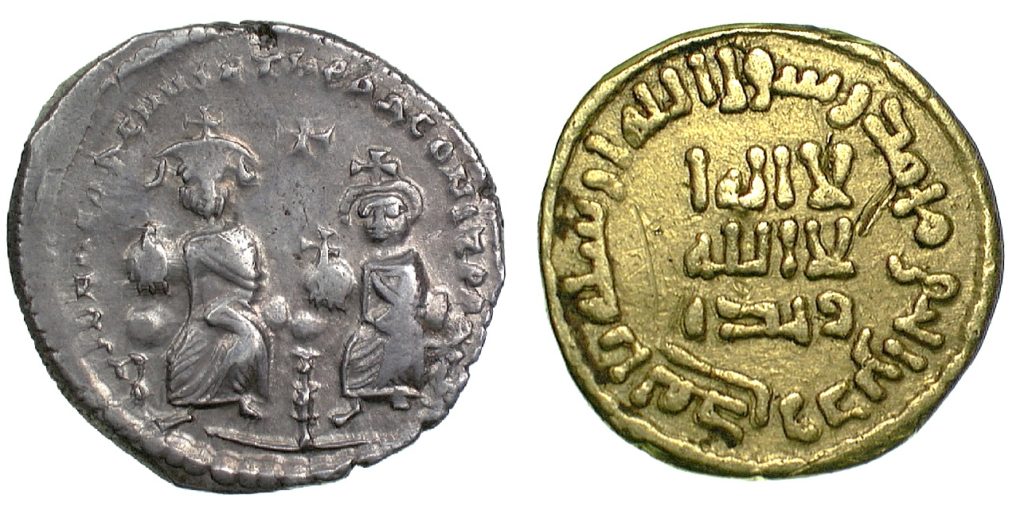The spread of Islam is often seen as one that was initiated 'by the sword'. However, in this summary I will try and examine both external and internal factors within Islam which contributed to it's rise and spread between the 7th and 12th century, particularly with an emphasis on the early conquest of Byzantine territories.
 |
| Byzantine theological differences |
From one point of view, it could be argued that Islam spread not necessarily because of it's theological attraction or by the sword, but because of the social benefits it brought. For example, in a pre-Islamic world where tribal kinship was paramount and subsequent blood feuds characterised society, Islam brought a new way of life one which gave women the right to own property and divorce and one which brought a just rule of law. It was a way of life which did away with the concept of tribes and instead put emphasis on a community of believers who were monotheists (Ummah). Not only were tribal loyalties destroyed, but Islam and it's Qu'ran, unlike the preceding religions of Christianity and Judaism, claimed to be the culmination of God's message and offered order and stability in life with it's 5 pillars. This was theologically attractive to Christians especially, who were perhaps disillusioned with the theological division in the church between monophysites and dyophysites, which was concerned with the nature of the divinity of Jesus Christ. On the other hand Islam offered stability and a
revitalised form of monotheism, It claimed to be merely a successor to Christianity and Judaism. This fresh version of monotheism was best manifested in the construction of the Dome of the rock which was created using shimmering golden Byzantine mosaics and Orthodox Greek architectural style but was essentially new with it's calligraphic inscriptions of 'la ilaha ilala' - there is no god but god, and other inscriptions which claimed Jesus as being not the son of god, but merely a messenger. Therefore this newness and dynamism in itself could be one factor which encouraged the spread of Islam.
 |
| Byzantine inspired Islamic Dome of the Rock and Calligraphy |
 |
| Byzantine and Islamic coins |
A further social reason to explain the spread of Islam would be that it offered significantly more tolerance to Christian sects such as the Copts and the Armenians who were routinely persecuted by the ruling Greek Byzantine Christians. For example, in return for a tax (Jizya) non Muslims being 'ahl-al dhimma' - (people of the book) including christians/Jews and in some cases Zoroastrians were allowed to live peacefully, practice their own religion and abide by their own laws. In fact, during the early centuries of Islam, the Umayyads continued using the Greek language in their administrative tasks and even used similar templates of Byzantine coins. However it could be said that this wasn't a show of tolerance, it was merely a strategic act which would ensure the stability of the territory that the Muslims acquired, until a later time where they could change the language and coinage etc, which was indeed done under Caliph Abd Al Malik. The concept of tolerance however was best encapsulated in Islamic Spain of the 8th- 14th century where multicultural interaction aided in the flourishing of a civillisation as well as in the Ottoman empire. However it could be argued that this 'tolerance' wasn't total equality between religions as Muslims still gained most of the top beurocratic positions in administration. However this only provided impetus for the subject Christians and Jews to convert, hence allowing the spread of Islam.
It could further be argued that it was tolerance which enticed people to the religion and therefore allowed for it's spread. This would contradict the common misconception that Islam was 'spread by the sword', which is inherently wrong due to the fact that in the Qu'ran itself it is stated that 'there is no compulsion in religion'. Moreover, the first dynasty of Caliphs - the Umayyads, who presided over the taking over of Byzantine territories were not all too interested in converting their christian subjects as they were a vital supply of financial income via the poll tax that non Muslims were obliged to pay. Therefore conversions to Islam would stop this stream of capital. Moreover, historical evidence has shown there to be very little case to argue that there were forced conversions, hence enhancing the need for a comprehensive study on the spread of Islam.
Furthermore it could be said that Islam spread so rapidly purely by chance as potential rival powers at the time were weak. For example, the dominant empires of the Byzantines and the Persian Sassanids were locked in constant warfare with each other and were also engaged in proxy wars using the Gassanids and the Lakhmids as there client states. Therefore, they themselves were weak not only militarily but theologically. Byzantium was also suffering from a lack of morale in the sense that the heart of the empire- Constantinople had been targeted by both Persians, Slavs and Muslims. The Byzantines as a result began to question the pillars of their theology, for example, was decorating churches with icons permissable? Was this why the Byzantines were becoming weaker as the Muslims were growing stronger? Did God displease of icons and the growing ritualisation of orthodox Christianity in which people were mixing the ink of Bible verses into water to drink? The Muslims prohibited iconography? These were all questions that Emperor Leo III asked himself, before unleashing the iconoclasm in which he destroyed many churches and persecuted many christians who were undertaking such rituals. This shows the internal and theological weakness of the Byzantine empire at the time of Islamic expansion. It could therefore be said that Islam didn't spread so quickly primarily because of the religion itself but because of the weaknesses of it's once powerful neighbours.
To conclude, although Islam spread quickly because it was indeed theologically vibrant, new and a break from warring Christianity and the fact it offered social and economic opportunites for
advancement. Ultimately it was the weakness of the surrounding Byzantine and Sassanid empires which gave Islam the impetus to spread as Islamic rulers were able to apply their new principles of tolerance and community which appealed to persecuted minorities. Moreover, the efficiency of early Islamic empires also played a part in it's spread as well as the fact that in some ways early muslims merely built upon the existing structures of the Byzantine and Sassanid empires. It could be said that this helped in the spread of the Islamic empire as by not causing a sudden change to the status quo, the Umayyads and others were able to slowly adapt their society, avoid revolts and eventually expand the Islamic empire from Spain to China, Therfore ultimately it could be said that the spread of Islam was due to a combination of external weaknesses and the strength of Islamic principles to capitalise on those weaknesses.

